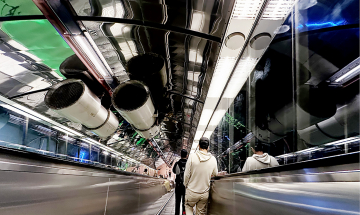
A New Industrial Deal for the European People?
A spectre is haunting Europe – the spectre of economic decline. For long, industrialists have warned of the decreasing fortunes of the EU economy. Politicians and the public are starting to catch up. Particularly when compared to the performance of the United States and China, the state of play is unflattering for Europeans. A fall in prosperity and living standards would naturally also directly translate into a decline in political influence: an EU that is more dependent on other economies and represents a less important market would not be able to exercise significant soft power on the world stage anymore.
Just how existential this threat is to the EU was stressed by none other than French President Emmanuel Macron. In a landmark address on the Union’s future at the prestigious Sorbonne University of Paris on 25 April, he warned: “We must be conscious of the fact that our Europe, today, is mortal. It can die. It can die and this solely depends on our choices.”
Yet what are these choices? Especially against the backdrop of a terse EU election campaign, European policymakers have thus begun to scramble for solutions to restore Europe’s economic power. The consensus developing in Brussels is that the Union needs a new and more robust industrial policy – meaning at its core that the EU must take decisive measures internationally competitive industries not only continue to be based in Europe, but that the Union’s industrial base is further expanded. However, there is still a debate over what the pillars of such an industrial policy should be.
The Union needs a new and more robust industrial policy.
Generally, there is agreement that the EU needs to simplify and reduce the bureaucratic burden for businesses. Nearly all European political parties have thus highlighted in their manifestos that European industries are often facing unnecessary EU red tape – even the European Greens. At national level, these calls have been echoed by the German, French, and Italian Governments.
The problems are not just rooted in Brussels, however. There is also a growing acceptance that Member States need to give up more of their regulatory powers: former Italian Prime Minister Enrico Letta thus stressed in a long-anticipated report that it was high time for the EU’s fragmented capital, energy, and telecommunications markets to be fully harmonised. He also warned that national governments needed to be prevented from introducing national regulation on top of EU law: otherwise, twenty-seven rather than one rulebook would de facto apply in the Single Market. Macron endorsed many of Letta’s key proposals in his Sorbonne Speech, thereby giving them even greater weight.
Yet reducing bureaucracy and deeper market integration are not enough to turn the European economy around, according many – including Macron. In his address, he stressed that the very foundations of the EU’s economic model needed to be overhauled: the belief in liberal market and trade economics that had underpinned it until the present day were out of kilter with modern geoeconomic realities of a steady move away from globalisation. In its stead, the French President is advocating for much firmer intervention of the state in the market: in his view, only a permanent relaxation of state aid rules combined with more restrictive trade measures, dedicated support programmes for critical technologies, and even new joint EU borrowing could truly safeguard the success of Europe’s digital and green growth strategy.
In proposing this, Macron has been touching upon some of the most controversial questions of EU macroeconomic policy: strict competition laws and the promotion of liberal world trade were not only seen as benefitting the EU at global level, but crucially also significant to maintain a market balance within the bloc. Calls to loosen state aid rules and instate protectionist trade measures were thus routinely rejected by a critical mass of EU governments and industry players.
There are no EU leaders who could offer a major counterweight to the French President.
However, the tide may now be turning in Macron’s favour: with the potential exception of Polish Prime Minister Donald Tusk, there are no EU leaders who could offer a major counterweight to the French President. European Commission President Ursula von der Leyen, who is striving for a second mandate, is also strongly reliant on the backing from Macron to return to the Berlaymont.
Likewise, the French President’s ideas have been echoed by a certain share of European industry: the so-called “Antwerp Declaration”, initiated by the trade associations of Europe’s energy-intensive industries, thus calls for a European industrial deal underpinned by “a simplified State Aid framework” that appears to be broadly in line with the economic thinking in the Elysée Palace.
This presents Finnish industries with a great risk: without a fair state aid regime, businesses based in Member States with greater fiscal legroom will enjoy a systemic advantage over Finnish firms, distorting the Single Market. If the EU imposes excessive trade barriers, Finnish companies will find it harder to source materials and products, while the Finnish export industries would likely have to contend with retaliatory measures in non-EU markets. In the worst-case scenario, therefore, such a dirigiste economic programme could greatly harm the competitiveness of Finnish companies both at European and at global level.
To ensure that a new European Industrial Deal will balance the interests of all Europeans, the critics of Macron’s approach will have to rally fast to offer a different vision that promises to break the economic deadlock that the EU is finding itself in – briefly, to put in the words of the French President, to make sure that the EU makes the right choices in the crucial five years to come.
Further information:
Henrique Laitenberger, Head of EU Affairs, tel. +358 (0)40 353 1326, henrique.laitenberger@teknologiateollisuus.fi, Twitter: @ToEnLaiten
Read also:
Technology Industries of Finland Messages for the EU Elections 2024: A View to 2030 – The EU Should Put Competitiveness First and Return to Its Original Values


